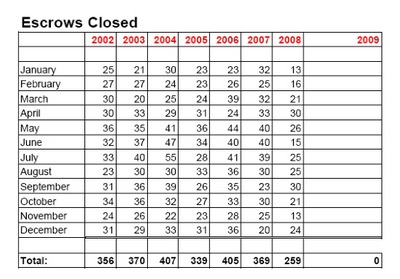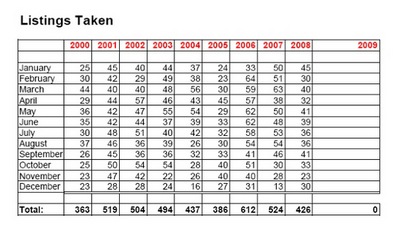A great question from Mike Price in response to this post:
Russell,
What percentage of brokers would you guess use any sort of formalized tracking system for analyzing lead sources? At an agent level?
When you finally created and implemented a business system, did you put into place your own tracking system or did you use something off the shelf?
Excellent questions, Mike. I’m glad you used the word, "guess", because that is what I will have to do to respond. At the broker level, I am thinking any brokerage firm with 20 or more agents – that is still in business and has the resources to stay in business – uses some sort of stat analysis. I don’t know about the tracking part. Keep in mind that a "lead" to a brokerage firm is seldom a buyer or seller – it is an agent. One they can hire. A lead for a brokerage firm is a possible hire. Most successful brokers are not in the real estate business – they are in the get and keep agents business.
At the agent level, it is an easier question to respond to – as all successful agents keep some kind of stats. Sometimes referred to as, "they know their numbers". They seldom know them all and there are some stats that most agents will go out of their way to "not-know" (like actual number of listing appointments). But top agents will typically have a pretty good idea of how many listings they take a month, how many closings they have a month, how many leads they get a month, how much income they get per year and per month. The better ones will have their lead sources specifically named, as well. How many deals did I get last year from referrals? From internet leads, from my geographic farm, etc.
Any agent not keeping those stats (which I am estimating at 93% of all Realtors) will not be able to do much business. My answer to your lead question is 7%. Nationally, and in most specific locations, 7% of the agents do over 80% of all of the business. It isn’t 80- 20. It is 93 – 7. 7% of the agents do almost all of the business and 93% of the agents do the remaining 20% of the business. There is a bright line of demarcation between the two groups. That line is keeping track of important stats.
The answer to your 2nd question is easy. I used the "count them once a month" method and then transferred the "IIII", then crossing through with a line = 5, into a spreadsheet. I’ve included three of those stat sheets here. As you can see I have not yet bothered to enter January or February’s stats to the Excel spreadsheets. Very sophisticated, I know. 🙂
And from Dru Bloomfield to this one:
Russell,
You should know that this post has generated side bar conversations. The face-to-face kind. One of the points that came up in a couple of these conversation was that any Gen X/Y Realtor needs to seriously consider online social network as part of their marketing mix. They are there anyway – it’s where they grew up. It’s where their future client base is and will be.
Some of us who are older may be less comfortable with this kind of relationship building, but in fact, that is what is happening. I watched Amy Cherow and Phil Sexton greet other like old friends yesterday. They had never met in person before, but they immediately jumped into a prior Twitter
conversation about skiing that went on and on.
I think that we can talk about marketing and SEO and producing, but ultimately what these on-line tools are doing is building relationships. In this fast-paced world, we are all looking for instant gratification or proof that our efforts are working.
That being said, social networking isn’t for everyone, just like TV or direct mail don’t fit for others.
My humble opinion is that agents must market in a way that’s enjoyable and productive individually, since these actions must be repeated over and over to achieve their personal goals.
I realize this brands me as someone suffering from something other than terminal hipness but I don’t really understand someone getting a tattoo. I understand the desire to "be unique". I understand how the process of getting the ink under the skin is considered art by some. I have many friends who have "gotten inked". But the bottom line is, I really don’t get it. Why, in the name of God would someone want to f–k up their body permanently for something that is guaranteed to look just awful later?
I feel exactly the same way about "social networking". I don’t get it. What the hell does it have to do with business? Or me?
Big businesses are usually based on marketing (getting the customer to reach toward you first) as opposed to prospecting (you reaching to the customer first). Speed of getting a potential customer’s questions and concerns responded to accurately and quickly is of paramount importance. But I don’t even take my cell phone with me when I am out of my car (unless I want to play solitaire while I eat). I get about 150 emails a day. As it is now, I already have all the off-beat requests, odd issues, and "important news" coming my way that I can handle. Already, I "delegate graciousness". I am not trying to network. That said, there is nothing that Drew wrote I disagree with – nothing. Like getting a tattoo, it isn’t for me. Doesn’t mean it can’t be art. Or fun.





